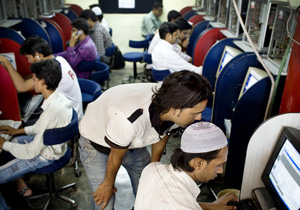New Delhi, Aug 12: Indian Internet users will surpass the number in the US by the end of this year and around 500 million people will be online by 2018, Rajan Anandan, managing director, Google India said here Tuesday.
"Even at the current growth rate, we will have 500 million Indians on the Internet by 2018. By the end of this year, India will become larger than the US in terms of number of Internet users. By 2018, India will have twice the number of Internet users as the US does. Almost half the country will be connected through the Internet," he said while addressing "Digitizing India" organised by FICCI Ladies Organisation.
He mentioned that it took the country 10 years to go from 10 million Internet users to 100 million Internet users. Now the country is adding five million new Internet users every month. India now has over 200 million Internet users.
"A lot of people talk about the last elections (2014 general elections) and how urban India was mobilised using the Internet. We have seen nothing yet in terms of what the Internet can do to every aspect of life, of society and of governance. By the next elections (expected in 2019) almost half a billion Indians will be connected through Internet. In terms of the kind of mobilisation, can you imagine what it can do?"
He mentioned that the path of purchase has changed in India and people are increasingly using online platform for retail purchase.
Talking about the next big technology wave in the world, he said wearable gadgets are expected to take four years to reach a billion consumers.
"Everything is getting accelerated with technology. Every new wave of technology has taken half as long as the previous technology. The next big thing will take half the time taken by smartphones," he said.
Smartphones took eight years to reach a billion consumers. "The future is here. Wearable devices are the next big thing. It is taking on computing. All these wearable devices will penetrate across the world very fast, and with it technology will get better and better," he added.
He also mentioned that software will impact traditional industries in a big way in the coming days. "Like the automotive industry has not changed much in the last 50 years. The next big thing that could happen is the driverless car. In the next 20 years, in our lifetime, software can do anything," Anandan said.
He pointed out that consumers are now connected through numerous devices like television, notebooks, laptops, smartphones and wearable devices as well.
In 2014, 2.8 billion people in the world out of seven billion are connected through the Internet. By 2020, it is expected that five billion people will be using the Internet.





Comments
Add new comment